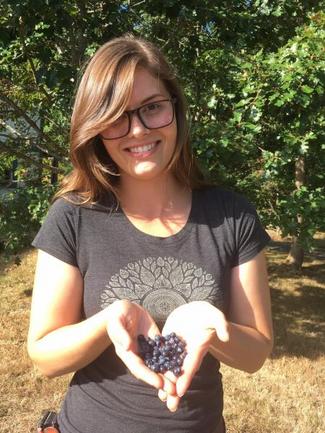
“As the importance of ecological conservation and restoration is better understood in relation to our changing climate, the propagation of native plants is a valuable branch of the horticulture industry.
The demand is there for native plants and will only increase. This need for ecologically valuable plants is created by conservation groups, environmentally aware gardeners and the government as environmental laws hold companies accountable for their impact on the environment. My interest in learning more about propagation comes from this perspective. I'd like to learn more about the timing and techniques involved in sexual propagation of native plants. Cultivating genetic variation in plants is how I'd like to help our industry respond to the changing climate of our modern world. “
- Madeline Clarke
The International Plant Propagators Society (IPPS) is a network of professionals all over the world who share an interest in plant production, horticultural research and education. With the motto: ‘ to seek and to share’ the IPPS aims to improve the knowledge, skills, productivity and professionalism of its members. The IPPS Western Regional Conference is an annual meeting. This year, conference is September 24 to 29, 2019 in Santa Cruz, Northern California.
The IPPS Western Region awards the Bruce Briggs Memorial Scholarship to deserving students in horticulture educational programs. VIU Horticulture student Madeline Clarke is this year’s recipient.

Pollination is a huge business and one of the biggest sources of income for beekeepers. Farmers want to ensure the highest crop yield possible, and one of the most efficient ways to do that is to pay for beekeepers to move hives into their fields during the flowering season. For us, that means moving hundreds of hives around Vancouver Island, most of which have been placed into cranberry fields. We have also built and moved hundreds of "nuc boxes" (short for "nucleus colonies"; they are basically small hives containing 4 or 5 frames) to Alberta for pollinating canola. Because the most important bees for pollination are the forager bees, we must wait until nightfall when the bees return home to the hive before packing it up. It's hard and heavy work, and sometimes we don't get home until 3am or later, but it's an essential aspect of beekeeping. Growers are guaranteed a higher yield, and beekeepers get the honey (and the pay cheque) out of it.
Everett Raynor

Horticulture Therapy is a unique offshoot of the Horticulture industry, and I've been overwhelmed by the influence plants and natural settings can have in the well-being and health of elderly adults. My role involves a balance of horticultural tasks and therapeutic program facilitation, meaning the tasks are adapted to suit the gardener's capabilities. Whether it's deadheading, transplanting, or even cleaning out our solariums, these familiar tasks lend to a sense of purpose and peacefulness. I've met many retired Master Gardeners, Milner Garden volunteers, and esteemed horticulturalists!
The photo attached is of two participants completing a transplanting task with veggies we propagated from seed. Simple tasks like these stay with a person for life.
Bianca van der Stoel

The riparian zone is a transitional area between an upland dry area and a water body such as a stream or lake. A healthy riparian zone will have various water-tolerant types of plants that function as a filter against sediment from entering the water body, while providing a root system that binds the soil together to reduce erosion. Shoreline vegetation also offers shade and wind protection that helps regulate water temperature, and provides critical habitat for insects, amphibians and other wildlife.
My job is to monitor our past sites to see how the plants we planted last year are doing, as well as visiting the new sites an determine what plants we should plant.
Alexandra Werk
